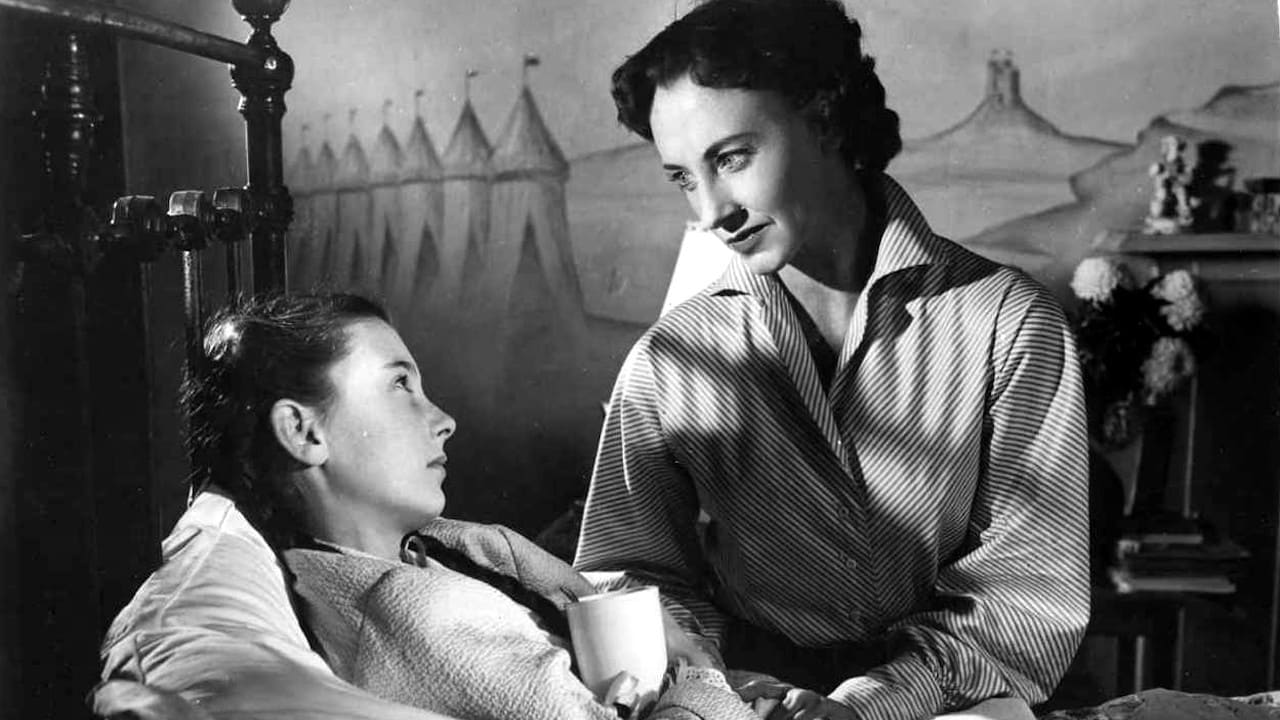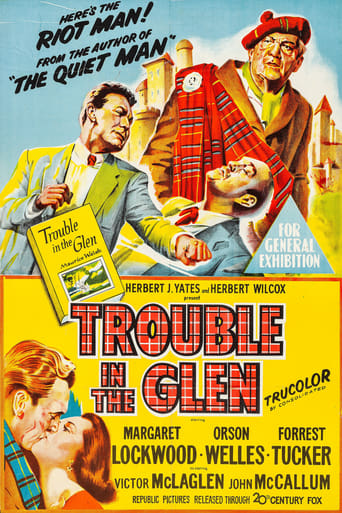

A film with more than the usual spoiler issues. Talking about it in any detail feels akin to handing you a gift-wrapped present and saying, "I hope you like it -- It's a thriller about a diabolical secret experiment."
... View MoreThis is a small, humorous movie in some ways, but it has a huge heart. What a nice experience.
... View MoreThere is, somehow, an interesting story here, as well as some good acting. There are also some good scenes
... View MoreThrough painfully honest and emotional moments, the movie becomes irresistibly relatable
... View MoreWhen American visitor Forrest Tucker comes to Scotland with a mysterious agenda, he finds himself taking on more than he can chew in dealing with powerful Orson Welles and his feisty daughter (Margaret Lockwood) with whom he starts off on the wrong kilt. Welles is the owner of a road which he refuses to open to the locales, and Tucker is desperate to get him to open it. Lockwood refuses to allow Tucker to see her father, and soon it's a battle of wills between each of them. After Lockwood publicly humiliated Tucker, he sets off on delicious payback, and this opens the way up for them to begin communicating. It's sort of a Scottish "Taming of the Shrew" where the shrew won't bend, that is until he allows her in on a little secret that changes everything. The plot turns deadly as the Scottish locales (lead by Victor MacLaglen) band together to take desperate measures to get the road open.For much of the film, the atmosphere is light and comic, so the sudden twists towards the end are jarring. This was produced and directed by British film veteran Herbert Wilcox, so I'm wondering if he first had wife Anna Nesgle in mind for Lockwood's part. She's tough, crafty and no-nonsense, but don't expect the vixens of her Gainsborough type villains here. Tucker is a rugged but easy going hero, and Welles is a big pussycat underneath his character's gruff exterior. Some pretty Scottish scenery adds to the flavor, although a little bit of bag pipe music goes a long way. Oh, and by the way, my tagline at the top of this review is Welles' line, not Tucker's.
... View MoreU.S. Air Corps Major Lance Lansing (Forrest Tucker) returns to Scotland after WWII to a small glen, where he makes his home due to the laird, Sanin Mengues (Orson Welles), a wealthy South American who's returned to his ancestors' land with his daughter, Marilla (Margaret Lockwood).Everyone in the glen tries to persuade Mengues to bring piece to their homes, only to have Lansing and Parlan (Victor McLaglen), the Mengues foreman, get in a fight together.This was listed in my UK TV schedule as a good film and they have it a three-star rating. They made it sound like it was a film about Orson Welles visiting Scotland after the war, which is far from the actual plot.Welles really chews up the scenery - in a bad way. He's funny but also quite annoying and seems out of place. Lockwood is given little to do but be pretty. Tucker is so-so.I was disappointed because I was expecting something entertaining and "classy," whereas instead I got a boring, dull and sappy "nice" movie without any real positive traits.It's not terrible, it's just not very good.
... View MoreRepublic Pictures's biggest hit was "The Quiet Man", John Ford's Irish blarneyfest. Two years later its writer, Frank S Nugent, tried to work that magic on the Scottish Highlands. But "Trouble in the Glen" only had the prolific hack Herbert Wilcox at the helm, and his winning streak with Anna Neagle had gone phfft.Lensed in sludgy brown Trucolor, "Trouble in the Glen" plays like an Ealing comedy sans asperity, fading quickly into the Celtic twilight from which Brigadoon rises once a century. Orson Welles is a returning laird whose years in South America presumably explain his swarthy skin tones if not his blue-grey bouffant wig. Welles was already a podgy Hollywood outcast wandering the European co-production badlands, scrounging, spending and sometimes shooting: he was between "Othello" and "Mr Arkadin" at this juncture. He relies on his magnificent organ voice and eyes that gleam in the gloom (as in "Jane Eyre") to sustain his turn as a tyrant, at odds both with his glenfolk tenantry and with a roving gang of tinkers. The head "tink" is the terminally fuddled Victor McLaglen, another Ford veteran.Stuffing casts with faded US talent to win a Stateside circuit release was standard operating procedure for the struggling Britflick biz of the early 1950s. Besides Citizen Kane and Sgt Quincannon, "Trouble in the Glen" toplines the colourless Forrest Tucker. Like John Wayne in "The Quiet Man", Nugent makes him a Yank on a sentimental journey. Like Wayne, he banters or scraps with the locals and tames a spirited filly: Maggie Lockwood, the laird's daughter, in reality four years older than Orson! Her cut-glass accent matches neither Welles's nor the area's Scotch English. There is also a winsome, bedridden little girl for Tucker to set on her feet.The subplot concerns unjust suspicions that the tinkers stole a deer. Has there ever been a movie in which gypsies or traveling people actually did the crimes of which they are accused?
... View MoreI saw this film in the mid fifties while in the Navy and was struck by Welles's performance along with Tucker and McLaglen. A subtle comment on social divisions, showing the Gypsy "Tinks" or itinerant tinkers of Scotland who form a class of social pariahs. The storyline is a bit thin but the two great blusterers, Tucker and McLaglen make it worth the price of admission...although I believe I saw this film on the hangerdeck of the USS Bonhomme Richard CVA-31 in 1955 for free...
... View More